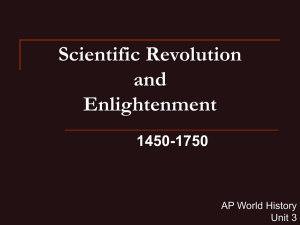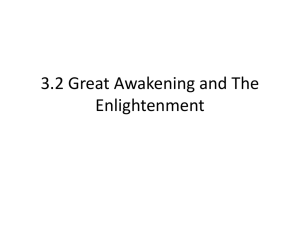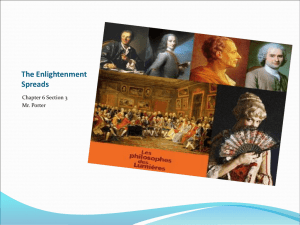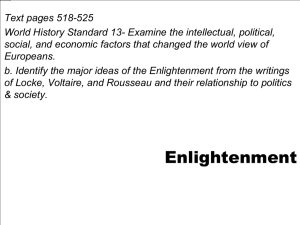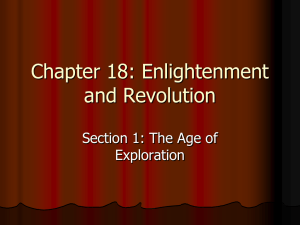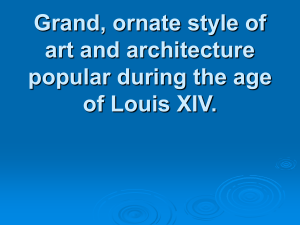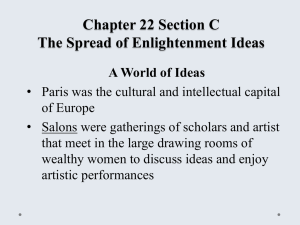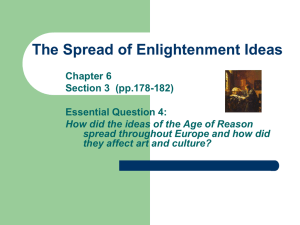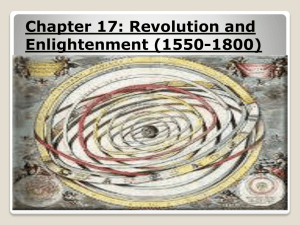Document
advertisement
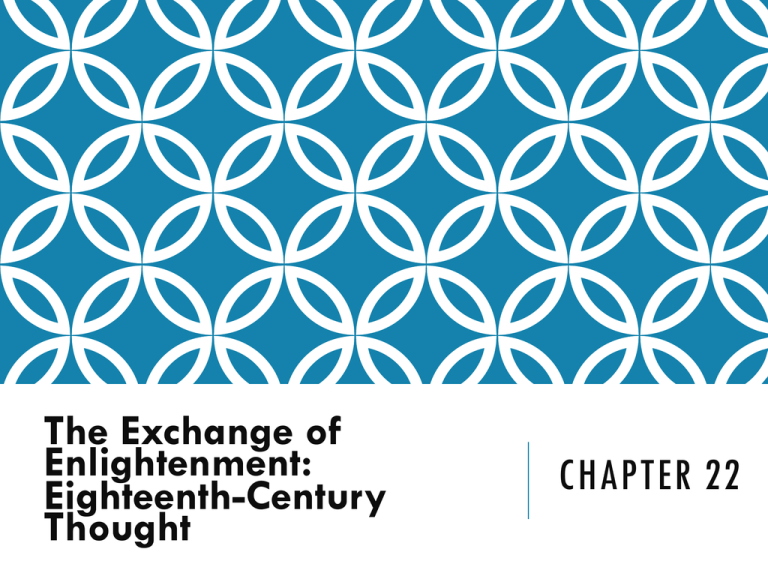
The Exchange of Enlightenment: Eighteenth-Century Thought CHAPTER 22 FOCUS QUESTIONS WHAT WAS the Enlightenment and how did it influence Western social, political, and economic thinking? HOW DID China and Japan view Europe in the eighteenth century? WHY WERE the ideas of Rousseau so influential? WHY WAS there a reaction against the cult of reason, and what forms did it take? HOW DID Enlightenment ideas influence the course of the French Revolution and Napoleon’s policies? WHAT INTELLECTUAL trends did Europe, the Americas, Islam, and east Asia have in common in the eighteenth century? BASIC IDEAS OF ENLIGHTENMENT AND ROMANTIC THINKERS People are good. Political freedom, economic freedom (laissez-faire), social equality John Locke and the Baron de Montesquieu Rule of law, “Natural Rights” Adam Smith, The Wealth of Nations “Invisible hand” of the market All men are created equal: John Locke Montesquieu and Wollstonecraft: women too Romanticism: “Noble Savage” Jean Rousseau Intuition is stronger than culture. Organized religion is bad. Atheism, reason, scientism, mysticism, enthusiasm, trust in sensibility are all possible responses. Enlightenment: reason can uncover truth. Romantics: trust in intuition, sensibility. Progress is good. Trust in science and reason. Lack of progress in science becomes a mark of a stagnant/primitive society. GLOBAL INFLUENCES ON THE ENLIGHTENMENT China and Japan: ideas about government (Confucianism) are idealized or despised. Enlightened despotism (Voltaire) Oriental despotism (Montesquieu) Ottoman Empire: admiration for religious toleration, generosity, good hygiene, education, and respect for law and minorities; loathed by others as arbitrary, despotic, and promoting docility among its subjects INFLUENCES ON THE ROMANTIC MOVEMENT Development of the Cult of Nature Power of the New World Exploration of the Americas: Baron Alexander von Humboldt Impact on John Keats’ poetry Rousseau and the “Noble Savage” William Wordsworth and Johann Herder Exploration of the Pacific: Captain James Cook Myths destroyed: mapping of the Pacific Colonization of Australia and New Zealand suggested a new “New World” ENLIGHTENMENT INFLUENCES REVOLUTION IN FRANCE AND IN NORTH AMERICA France Overthrow of the monarchy Radical new “rights” for citizens announced Marquis de Sade and Napoleon Perversion of the Enlightenment and of romanticism Wars with European states leads to global conflict North America American Revolution CONCLUSION Europe’s new global connections profoundly influenced the ideas of the Enlightenment and of the romantic movement. The Enlightenment was a revolution in human thought that opened up new possibilities for every facet of society, culture, and life. As Napoleon and de Sade illustrated, it could also lead to dangerous extremes of egoism and brutality that, because of the global nature of Europe’s empires, could affect all humanity. TODAY’S QUESTION Is the Enlightenment dead? Consider Spreading fundamentalist rejection of science The return of torture, outlawed by all major European states during the Enlightenment, as a tool even of states such as the U.S. that espouse Enlightenment principles of human rights. The obvious downsides of technological development (nuclear weapons, environmental degradation) that call into question Enlightenment belief in “progress.” Are Enlightenment principles of rationalism, optimism, and secularism a thing of the past? Or does belief in science, progress, and religious freedom and toleration mean that we are still followers of the Enlightenment? Should we be?
